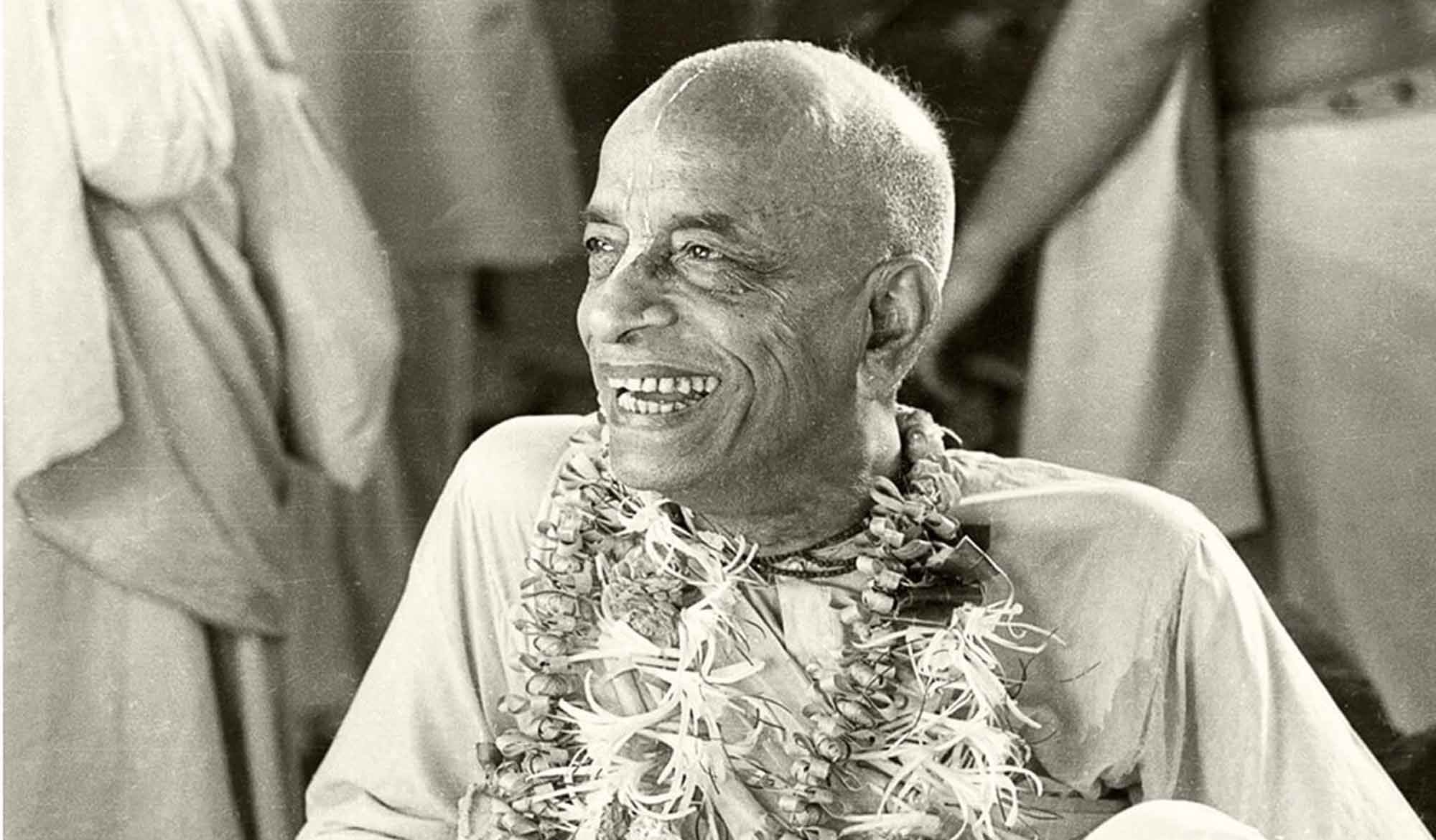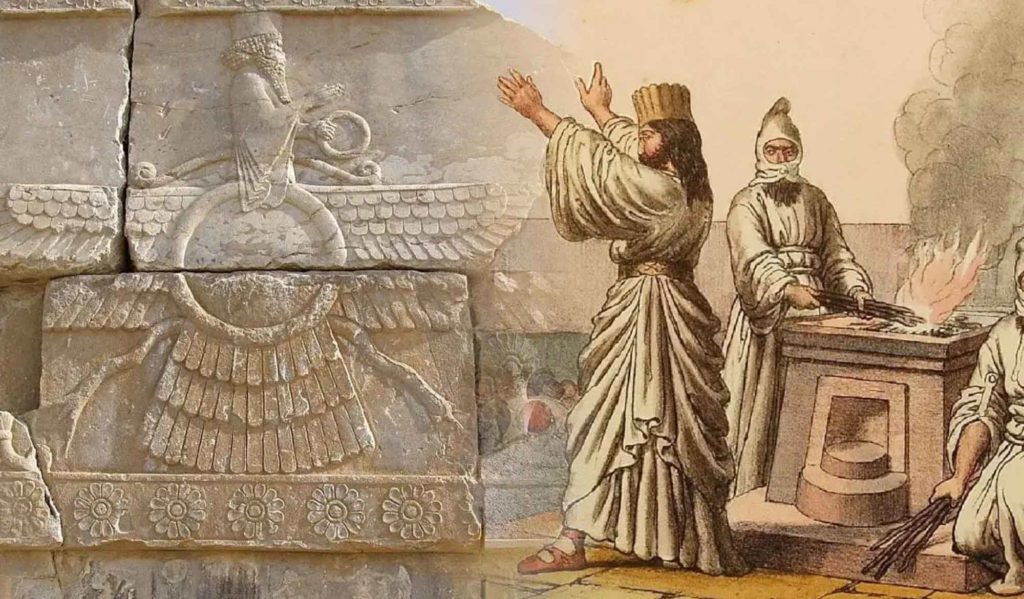Overview
This comedy was written by Śrīla A.C. Bhaktivedānta Swami Prabhupāda in 1953 and published in the Gauḍīya Pātrikā, Vol.5, Issue 1. In this play Prabhupāda pokes fun at the so-called ‘renunciation’ of a popular religious institution whom he refers to as the Murgi Mission (‘Chicken Mission’) due to their non-veg diet. This has been translated for the first time into English by Sanātana Dāsa and Parameśvarī Dāsī.
Vairāgya-Nāṭaka
(A Drama about Renunciation)
(Based on hāsya-rasa – the mellows of humour)
CHARACTER INTRODUCTION
1) Swami Kañcana-vilāsa (1st Sevaite and Trustee)
2) Ananta-kāma Caramahaṁsa (2nd Sevaite and Trustee)
3) Snehāsikta Gṛha-vinoda (3rd Sevaite and Trustee)
4) A Gentleman (very much afflicted by the fire of material family life)
5) Neighbour (His one and only friend)
6) Udarānanda Svādu (A canvasser)
7) Bhudhara Swami (A staunch sannyāsī)
8) Nibhṛta Kumārī (A female sevaite)
The Place – Jagat-mithyā (the illusory world).
The Time – At all times.
******
SCENE ONE
(Enter a Gentleman and a neighbour)
Neighbour: So Mahāśaya, did your daughter’s marriage happen?
Gentleman: What can I say? I thought that by marrying off my daughter I’d be able to renounce family life. But Bhagavān’s desire is different. Whatever money I saved for it was spent in another way.
Neighbour: How did you spend all that? What situation came about that you had no option but to flutter it all away?
Gentleman: By having a court case with the landlord. The case ran on for three years. Out of that, three times in the High Court, what to speak of the lower courts! Finally I won, but three thousand rupees was spent. Now tell me – how can I get my daughter married?
Neighbour: Then what have you decided to do now?
Gentleman: You are my one and only friend. I’ll not hide anything from you. If you listen to what’s on my mind then I’ll tell you, and if you make fun of it, then I’ll not tell you.
Neighbour: What are you saying! Would I make fun of you during your time of grief? Don’t think like this at all! Just as you consider me to be your friend, please know that I am also your well-wisher. You can unhesitatingly speak your mind to me.
Gentleman: I’ve decided that I will become a sannyāsi in the ‘Murgi Mission.’ I don’t like family life anymore. If I go to the Murgi Mission I will not have to face much hassle. They’re very liberal! There’s no confusion about anyone’s opinion – any opinion from anybody is entertained there. And the most convenient thing is this – if one takes sannyāsa there, one doesn’t have to follow any particular rules.
Neighbour: But if you take sannyāsa you’ll not be able to go home. Of course, there’s no restriction concerning pān, cigarette, fish, meat and chicken in the Murgi Mission – just speaking Vedānta is enough. And sometimes you can distribute a little homeopathic medicine. But if you wear red cloth, you’ll not be able to go home. What will happen to your wife?
Gentleman: I’ve discussed it with my wife. In the locality of my wife’s father’s house. her friend’s husband became a sannyāsī in the Murgi Mission, but he comes home sometimes. That’s why my wife’s friend has no problem. Food, clothing, ornaments – there’s no scarcity of anything.
Neighbour: What are you saying! A sannyāsī comes home again and mixes with his wife? I’ve never heard of this before!
Gentleman: Why brother? Tell me, what fault is there? If by becoming a sannyāsī one can take everything – pān, cigarette, fish, meat and chicken, then is it so wrong to go back to one’s home?
Neighbour: You’re mistaken. Eating fish, meat and chicken – all these are prescribed in the śāstra. What to speak of fish, previously the munis and ṛṣis even used to eat cow flesh after performing a yajña. Certainly the cow is an animal in sattva-guṇa. By eating cow, your sattva-guṇa increases – I’ve heard such things. But going home after becoming a sannyāsī? This I’ve never heard of. The very word ‘sannyāsī’ means to renounce wife, son and home. If he goes back home again, then how is he a sannyāsī?
Gentleman: (in a sombre mood) Do you know all the śāstras?
Neighbour: Tell me, how can I claim that? We’re ordinary householders, Tell me, where’s the time to read all the śāstras? I only know what I hear from others.
Gentleman: Rāvaṇa took sannyāsa – do you know that?
Neighbour: Yes, I’ve heard that. But he took sannyāsa in order to abduct Sītā. That’s not real sannyāsa.
Gentleman: Forget about what’s real and what’s not real! Do you know what is written in the Gītā? Kāryaṁ karma karoti yaḥ sa sannyāsī – that means, ‘such a plan has to be executed at all costs.’ One who works with such determination, he is a sannyāsī. Therefore, at that time, in order to abduct Sītā, there was no other recourse for Rāvaṇa. There’s something called ‘prestige’ – can’t you accept that?
Neighbour: Of course. People say, yāk prāṇa, thāk māna (‘Let life go, but let dignity remain’) Without any fault, the nose of Rāvaṇa’s poor sister was cut off. She was from such an aristocratic family, her brother was Rāvaṇa, and her nose was cut off! How is it that so much great prestige was destroyed! Can you say? In such a situation was there any other way to respond? Abducting Sītā was absolutely essential. But one thing is there – we have also read Gītā a little. The verse you spoke before – I have heard it is written, anāśritaḥ karma-phalaṁ (‘Do not take shelter of the results of your actions’).
Gentleman: Yes, that’s surely written there. The very meaning of anāśritaḥ karma-phalaṁ is this – whatever you do after taking sannyāsa, you won’t have to accept any result for those activities. Therefore, whatever I do, based upon my desire when taking sannyāsa, I will not have to suffer the result of my karma like ordinary people.
Neighbour: Then does the word ‘sannyāsa’ mean that one can do anything he likes?
Gentleman: You’re mistaken. As I said previously, kāryaṁ karma karoti yaḥ sa sannyāsī – when any work is to be done, there must be some fixed determination. Then, in order to accomplish that work, everything can be done. One just has to think, “I’m not doing anything!” By that it becomes niṣkāma-karma (desireless work) – thats all. If I take sannyāsa and go home and think, “I have not come home” – that’s enough! All this stuff about cid-vilāsa (spiritual pleasure) is difficult to understand. I’ve thought a lot about this subject. Don’t think that it’s a joke.
Neighbour: Whatever you may say, wearing red cloth and going back home looks bad.
Gentleman: But what else can be done? If I wear red cloth and disappear completely then my family won’t be able to continue. If I wear white cloth again and maintain my family, then I won’t get any money and my daughter won’t get married. If I wear red cloth and beg, then my maṭha/home will be nicely taken care of. It is much more convenient than having a job or running a business. Therefore, by begging a little, dividing fifty-fifty, I will give half to the Murgi Mission and half for my home. By this, I won’t have any inconvenience from any quarter. Now if I have to do this sort of activity, see if kāryaṁ karma karoti yaḥ applies or not! After that, when I give fifty-percent to the Mission, then anāśritaḥ karma-phalaṁ applies. This is because the remaining fifty-percent is for my own expense. And in śāstra only it is given, yuktāhāra-vihāraś ca (‘one’s eating and recreation should be regulated’). See? Is my thinking correct or not!
Neighbour: Certainly you have studied a lot more than me, I can’t argue on śāstra with you. But wearing red cloth after taking sannyāsa and going home – this I cannot agree with in any way.
Gentleman: Then what do you advise me to do?
Neighbour: If you become a sannyāsī of the Bhojanākhaḍa (a place where sādhus assemble to get food), then all your plans can still be successfully fulfilled without having to wear red cloth.
Gentleman: How’s that?
Neighbour: I’ve heard about the sevaites and trustees of the Bhojanākhaḍa. Of the three of them, one is a sannyāsī and one is a grandfather to a sannyāsī – in other words, at first he was a brahmacārī, then he became sannyāsī, and now he is a gṛhastha. If somebody becomes a gṛhastha after being a sannyāsī, then that is the highest state. They can be called a parama-paramahaṁsa or a caramahaṁsa – meaning that he has gone beyond the level of a paramhaṁsa and going to the other side, he has reached the highest of all the āśramas. The other fellow is a pakka–gṛhastha (typical householder). But even though these three are a sannyāsī, a caramahaṁsa and a pakka–gṛhastha, they have equal rights at the Bhojanākhaḍa. When they divide everything, they all get equal shares.
Gentleman: Okay, so a gṛhastha can also become a sevaite like a sannyāsī? That’s nice…that’s very convenient. What is it actually? Can you explain a little more elaborately?
Neighbour: I am not able to express it very well. But I have met someone who is their canvasser. If you want I can take you to him. If he likes, he can introduce you to those sevaites.
Gentleman: Is it? What’s the name of that gentleman? Where does he stay?
Neighbour: What’s his name? I don’t know exactly, but we call him Udarānanda Svādu (‘One who’s stomach tastes and relishes the pleasure of feasting’). I Know where he lives.
Gentleman: What type of name is that? What is the significance of the phrase udarānanda svādu? That name’s very strange.
Neighbour: He used to refer to himself as Udarānanda Sādhu. But one day, I saw him on Harrison Road catching hold of the Marwaris – “Oh Seth! Will you feed a sādhu? Will you feed a sādhu?” After saying that, a few Marwaris took him to a shop and fed him some very nice items. From that day on, we call him Udarānanda Svādu.
Gentleman: (laughing) I see you’re a man with a very good sense of humour. Accha! Do the Marwaris simply feed sādhus standing on the street without much thought?
Neighbour: Oh, if some svādu (relisher of food) canvasses on the street in this way, then somebody’s mind will be drawn. But that is only possible in the Marwari locality. It’s not possible in a Bengali area.
Gentleman: Don’t criticize the Bengalis for that. Although they don’t show special indulgence to such svādus, the fact is that it can’t be said that they don’t serve svādus. I was in Bombay for a few days. Many times there, the sannyāsīs of the Murgi Mission used to phone their devotees that, “Today give us some of Mother’s prasāda.”* I know the Bengali devotees used to feed those sannyāsīs sumptuously with fish, meat, duck eggs, chicken, luchi – all these things. So do you want to say that Bengalis don’t do svādu-sevā?
* Mother’s prasāda – non-vegetarian food offered to Kālī.
Neighbour: I can’t take your word on this. Why would the svādus of the Murgi Mission phone them and accept such an unnecessary invitation? They have arrangements for all that kind of food in their Mission itself! Why would they ask for more? Do they have some food shortage?
Gentleman: Did I say they have some scarcity? Previously you spoke about feeling ashamed due to public uproar. Most of the people in Bombay don’t eat fish or meat, especially the Gujaratis, Jains and Vaiṣṇavas. That’s why the Murgi Mission there, due to being in the public eye, doesn’t cook fish or meat on their premises. Because it’s not possible for them to eat vegetarian food every single day, on the days that they want non-veg, they call up their Bengali devotees. Anyway, enough of all these topics. Let’s talk about what we were originally discussing. You were saying that you would take me somewhere. If you take me there, it’ll be very helpful.
Neighbour: So you’ll be renouncing saṁsāra – you’ve decided on that then?
Gentleman: Renouncing means fifty-fifty, and I’ll also have to come home. If you think that going home wearing red cloth is bad, then just white cloth is okay.
Neighbour: Alright, I’ll take you to Udarānanda Svādu on Wednesday. We’ll plan it early Tuesday morning and go on Wednesday, as you like.
– Śrī Abhay Charan De, Bhaktivedānta
Editor, ‘Back-to-Godhead’ (Allahabad)
Related Articles
- 📖 Prabhupāda Vijaya (Book)
- Vairāgya Nāṭaka – A Comedy Drama by Śrīla Prabhupāda
- Guru-Bruva (The Pseudo-Guru) by Śrīla Bhaktisiddhānta Sarasvatī Ṭhākura
- Why We Fight by Śrīla Bhakti Gaurava Narasiṅgha Mahārāja
- Māyāvāda and Buddhism – Are They One and the Same? by Swami B.V. Giri
- Advaita Prakāśa Reviewed
- Prabodhānanda and Prakāśānanda by Swami B.V. Giri
- The Self-Defeating Philosophy of Māyāvāda by Gaura Gopāla Dāsa
- Vaiṣṇavism and Religious Equality by Gaura Gopāla Dāsa
Further Reading
- ‘Tattva Sāra’ (A book by a follower of Ramakrishna) by Śrīla Bhaktivinoda Ṭhākura
- Who is a Māyāvādī? by Śrīla Bhaktivinoda Ṭhākura
- A New Gaurāṅga (Nūtana Gaurāṅga) by Śrīla Bhaktivinoda Ṭhākura
- Siddhānta-Ratna – Written by Śrīyukta Upendra-mohana Gosvāmī of Khaḍadara by Śrīla Bhaktivinoda Ṭhākura
- Samālocana (A Book Review) by Śrīla Bhaktivinoda Ṭhākura
- Impersonal Spirituality and Transcendental Spirituality by Śrīla Bhaktivinoda Ṭhākura
- Samālocanā (A Critique of the book ‘Vanamālā’) by Śrīla Bhaktivinoda Ṭhākura
- Bhakti Caitanya Candrikā by Śrīla Bhaktivinoda Ṭhākura
- The Glory of Ārya Dharma Within Pure Sampradāyas by Śrīla Bhaktivinoda Ṭhākura
- Śrī Dayānanda Sarasvatī and the Tantra Śāstra by Śrīla Bhaktivinoda Ṭhākura
Prema Dhāma Deva Stotram with the Narasiṅgha Sevaka Commentary – Verses 61-65
In verses 61 to 65 of 'Prema Dhāma Deva Stotram', Śrīla Śrīdhara Mahārāja narrates the pastime of Śrī Caitanya at Caṭaka Parvata In Purī and explains how the scriptures produced by Brahmā and Śiva are ultimately searching for the personality of Mahāprabhu who is merciful too all jīvas, no matter what their social position.
Prabhupāda Śrīla Sarasvatī Ṭhākura’s Visit to Ayodhyā
With the forthcoming observance of Śrī Rāma Navamī, we present 'Prabhupāda Śrīla Sarasvatī Ṭhākura’s Visit to Ayodhyā' written by Śrīla Bhaktisiddhānta Sarasvatī Ṭhākura Prabhupāda from The Gaudīyā magazine, Vol 3. Issue 21/ In December 1924, after visiting Benares and Prāyāga, Sarasvatī Ṭhākura visited the birth-site of Śrī Rāmācandra in Ayodhyā.
Śaraṇāgati – The Only Path to Auspiciousness
In this article, 'Śaraṇāgati - The Only Path to Auspiciousness', Dhīra Lalitā Dāsī analyses the process of śaraṇāgati (surrender) beginning with śraddhā (faith). She also discusses the role of śāstra and the Vaiṣṇava in connection with surrender.
Ātma Samīkṣā – The Value of Introspection
In this article, "Ātma Samīkṣā – The Value of Introspection" Kalki Dāsa highlights the importance of introspection in the life of a devotee and especially in relation to the worldly environment that surrounds us. He also explains how transcendental sound influences our capacity to introspect.
Prema Dhāma Deva Stotram with the Narasiṅgha Sevaka Commentary – Verses 61-65
In verses 61 to 65 of 'Prema Dhāma Deva Stotram', Śrīla Śrīdhara Mahārāja narrates the pastime of Śrī Caitanya at Caṭaka Parvata In Purī and explains how the scriptures produced by Brahmā and Śiva are ultimately searching for the personality of Mahāprabhu who is merciful too all jīvas, no matter what their social position.
Prabhupāda Śrīla Sarasvatī Ṭhākura’s Visit to Ayodhyā
With the forthcoming observance of Śrī Rāma Navamī, we present 'Prabhupāda Śrīla Sarasvatī Ṭhākura’s Visit to Ayodhyā' written by Śrīla Bhaktisiddhānta Sarasvatī Ṭhākura Prabhupāda from The Gaudīyā magazine, Vol 3. Issue 21/ In December 1924, after visiting Benares and Prāyāga, Sarasvatī Ṭhākura visited the birth-site of Śrī Rāmācandra in Ayodhyā.
Śaraṇāgati – The Only Path to Auspiciousness
In this article, 'Śaraṇāgati - The Only Path to Auspiciousness', Dhīra Lalitā Dāsī analyses the process of śaraṇāgati (surrender) beginning with śraddhā (faith). She also discusses the role of śāstra and the Vaiṣṇava in connection with surrender.
Ātma Samīkṣā – The Value of Introspection
In this article, "Ātma Samīkṣā – The Value of Introspection" Kalki Dāsa highlights the importance of introspection in the life of a devotee and especially in relation to the worldly environment that surrounds us. He also explains how transcendental sound influences our capacity to introspect.








